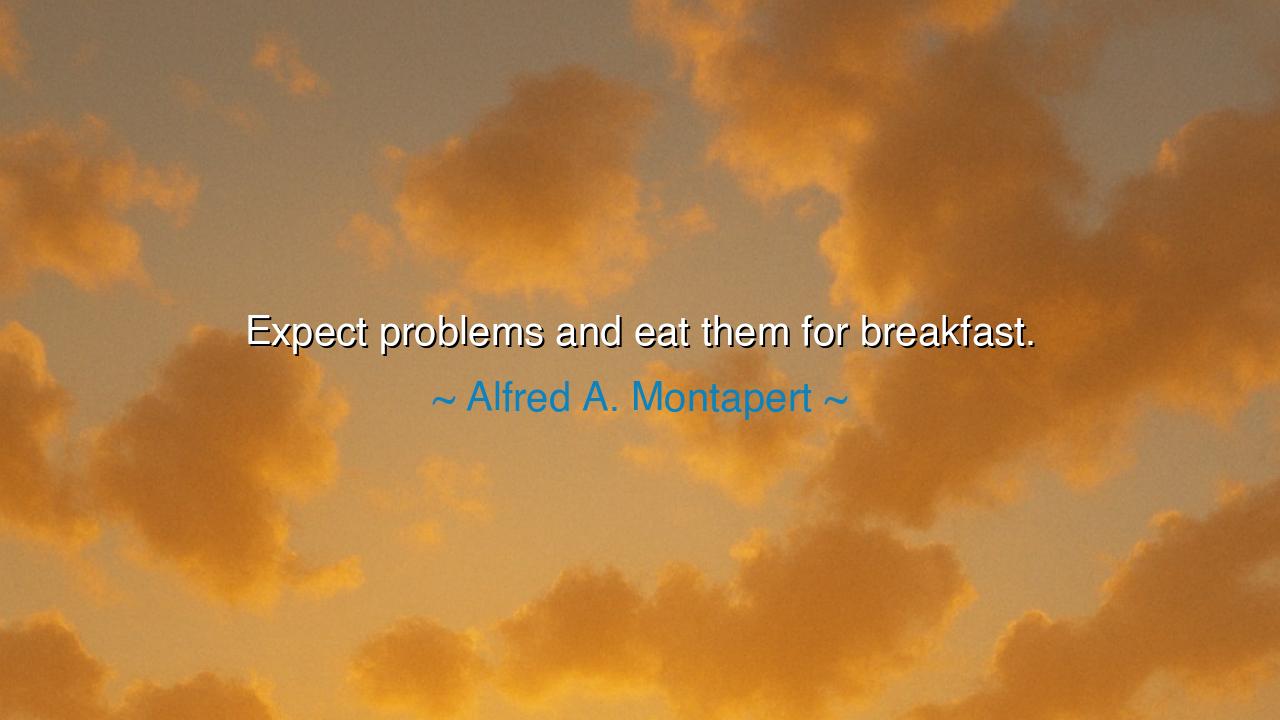
Expect problems and eat them for breakfast.






Hearken, O child of perseverance, to the words of Alfred A. Montapert, who declared with unflinching boldness: “Expect problems and eat them for breakfast.” This is no counsel for the faint-hearted, but a summons to the warrior spirit that lies dormant within every soul. For life is not a smooth road paved with roses, but a path strewn with stones, thorns, and trials. To expect otherwise is folly. Yet the wise do not tremble when adversity approaches—they rise at dawn, sharpen their resolve, and consume obstacles as nourishment for their strength.
To expect problems is to see the world as it truly is. The naive believe the sun will always shine, that fortune will always smile, and thus they are shattered when storms appear. But the awakened heart knows that struggle is woven into the fabric of existence. Problems are not signs of misfortune—they are the very training ground of greatness. They come as tutors, shaping patience, discipline, courage. To be shocked by hardship is to be unprepared; to expect it is to be ready, like a soldier who sleeps in armor.
Yet Montapert’s teaching goes beyond mere expectation. He commands us to eat them for breakfast—to face difficulties not with dread, but with eagerness, as the athlete welcomes the challenge that strengthens his limbs. When you eat something, it becomes part of you, transformed into energy. So too with problems: when faced boldly, they cease to be chains and become fuel for growth. Thus the strong do not merely endure trials; they feast upon them, turning pain into power, confusion into wisdom, and defeat into the seed of future victory.
Consider the life of Winston Churchill. In the darkest hours of the Second World War, when Britain stood alone against the tide of tyranny, problems pressed in on every side—bombs fell from the skies, enemies surrounded, allies faltered. A lesser man might have despaired, but Churchill expected such trials. He rose each morning with the fire of defiance, declaring that they would “never surrender.” He ate the problems of war for breakfast, transforming fear into unbreakable resolve. His courage sustained a nation and gave hope to a world on the brink of ruin.
So too in the quieter realms of life: the mother who bears hardship for her children, the worker who perseveres through toil, the student who struggles against ignorance—all eat their problems daily, and in doing so become stronger than they once imagined. It is not the absence of problems that makes a hero, but the mastery of them. The feast of trials is bitter at first, but it nourishes the spirit more deeply than ease ever could.
Let this lesson be written upon your heart: do not shrink from hardship, do not curse the day of trouble. Rather, wake each morning expecting it, and when it comes, consume it with courage. Say to yourself, “This difficulty is my food; it shall sustain me, not destroy me.” For the one who devours problems grows stronger with every bite, while the one who flees remains forever weak.
Therefore, O listener, train your spirit. Begin with the small problems—face them with calm, endure them with patience. In time, you will grow strong enough to eat the greater ones with joy. Make adversity your servant, not your master. For the world belongs not to those who avoid problems, but to those who rise each day to consume them.
Thus, the teaching endures: Expect problems and eat them for breakfast. Be fearless, be steadfast, and let every trial you face become a meal that strengthens you for the battles ahead. In this way, you will walk through life not as a victim of fate, but as a conqueror, nourished by the very struggles that sought to destroy you.






AAdministratorAdministrator
Welcome, honored guests. Please leave a comment, we will respond soon